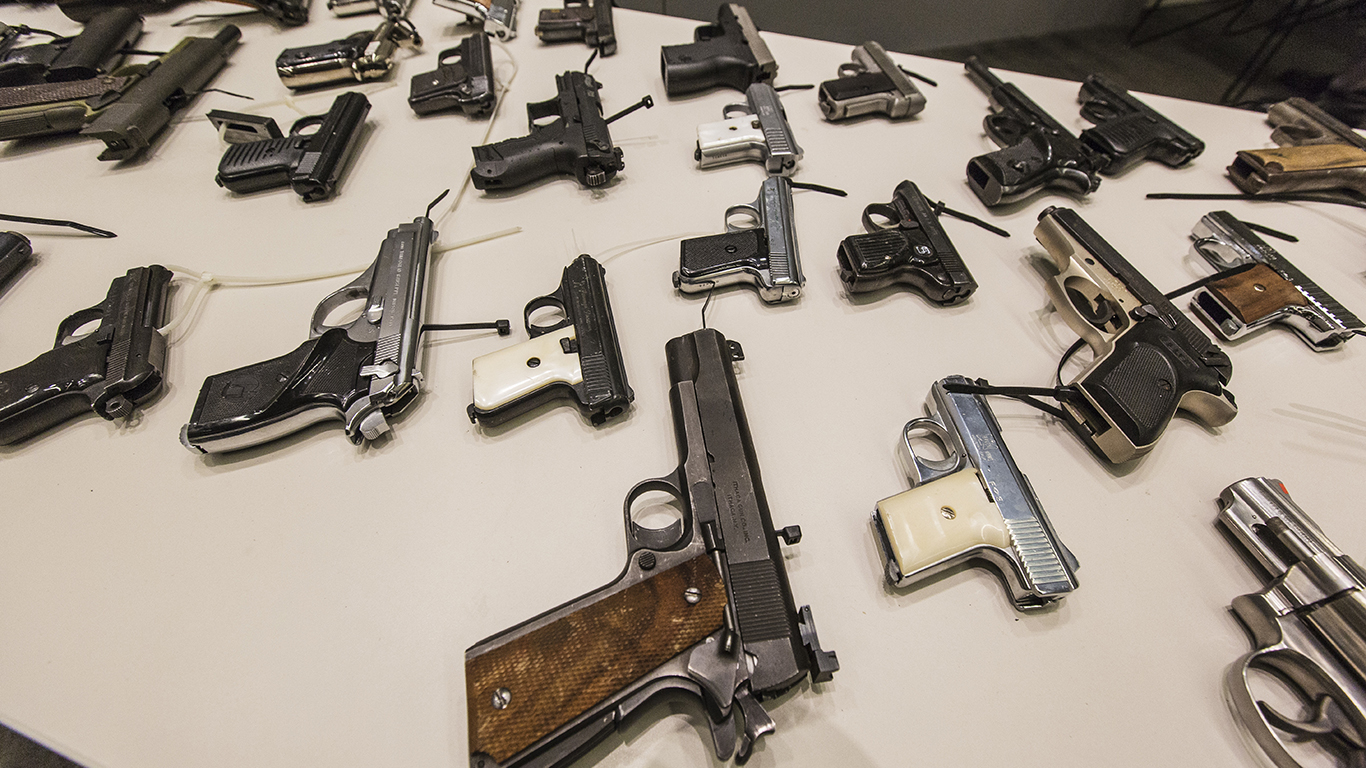
The Bill of Rights outlines many of the most basic freedoms Americans are entitled to – the right to free speech and religion, protection from cruel and unusual punishment, the right to an attorney, and the right to keep and bear arms are all among them. Unlike most fundamental rights, however, the right to firearm ownership is not absolute.
Under federal law, certain groups – including some convicted felons, fugitives, non-citizens, and those with certain mental illnesses – are prohibited from firearm ownership. Though possession of a firearm is a criminal offense for such individuals, there is no legal mechanism to proactively ensure compliance.
In the absence of federally backed enforcement protocols, many states have enacted their own policies that not only mandate, but also ensure that certain individuals give up their guns. Depending on the circumstances, state and local law enforcement in some parts of the country can confiscate an individual’s firearms for months or even years at a time.
Reviewing state-level laws compiled by the Giffords Law Center, a gun violence prevention group, 24/7 Wall St. identified the states where the government can take your gun. Without exception, the laws in the states on this list target only those deemed to pose a direct threat to themselves or others and impose no restrictions on responsible, law-abiding gun owners.
Of the 32 states on this list, the majority have enacted a set of laws known as extreme risk protection orders, or ERPOs. ERPO laws temporarily remove firearm access for persons showing clear warning signs of violence. They are often used to prevent potential suicides and mass shootings. (Here is a look at the number of American mass shootings every year.)
In some states, families and household members can initiate ERPO interventions, while in others, only law enforcement officials can. The level of proof needed to execute an ERPO also varies by state. In some cases, a preponderance of evidence is justification enough, while in others, a higher level of clear and convincing evidence is required. Generally, when an ERPO is carried out, the individual in question must relinquish their firearm or firearms to the proper authorities or else have their guns confiscated by law enforcement.
Many states without ERPO laws are on this list because of laws designed to verify that individuals convicted of crimes that prohibit firearm ownership have, in fact, relinquished their guns. In other states, law enforcement officials are compelled to remove firearms at the scene of domestic violence emergency calls. (Here is a look at the states where gun related crimes are surging.)
Click here to see the states where the government will take your gun by force.
Click here to read our detailed methodology.

California
> Firearm removal for “extreme risk” individuals: Yes, loss of firearm for a min. of 21 days, and a max. of 5 years
> Enforced gun removal for those with a crime-related possession ban: Yes
> Enforced gun removal for domestic violence convictions?: Yes
> Enforced gun removal for those under a domestic violence restraining order?: Yes
> Firearm laws for domestic violence emergency calls: Law enforcement must remove at least some firearms
[in-text-ad]

Colorado
> Firearm removal for “extreme risk” individuals: Yes, loss of firearm for a min. of 14 days, and a max. of 1 year
> Enforced gun removal for those with a crime-related possession ban: No
> Enforced gun removal for domestic violence convictions?: Yes
> Enforced gun removal for those under a domestic violence restraining order?: Yes
> Firearm laws for domestic violence emergency calls: None

Connecticut
> Firearm removal for “extreme risk” individuals: Yes, loss of firearm for a min. of 14 days, and until respondent is determined to no longer be a risk
> Enforced gun removal for those with a crime-related possession ban: Yes
> Enforced gun removal for domestic violence convictions?: Yes
> Enforced gun removal for those under a domestic violence restraining order?: No
> Firearm laws for domestic violence emergency calls: Law enforcement can remove at least some firearms

Delaware
> Firearm removal for “extreme risk” individuals: Yes, loss of firearm for a min. of 15 days, and a max. of 1 year
> Enforced gun removal for those with a crime-related possession ban: No
> Enforced gun removal for domestic violence convictions?: No
> Enforced gun removal for those under a domestic violence restraining order?: No
> Firearm laws for domestic violence emergency calls: None
[in-text-ad-2]

Florida
> Firearm removal for “extreme risk” individuals: Yes, loss of firearm for a min. of 14 days, and a max. of 1 year
> Enforced gun removal for those with a crime-related possession ban: No
> Enforced gun removal for domestic violence convictions?: No
> Enforced gun removal for those under a domestic violence restraining order?: No
> Firearm laws for domestic violence emergency calls: None

Hawaii
> Firearm removal for “extreme risk” individuals: Yes, loss of firearm for a min. of 14 days, and a max. of 1 year
> Enforced gun removal for those with a crime-related possession ban: No
> Enforced gun removal for domestic violence convictions?: No
> Enforced gun removal for those under a domestic violence restraining order?: No
> Firearm laws for domestic violence emergency calls: Law enforcement must remove at least some firearms
[in-text-ad]
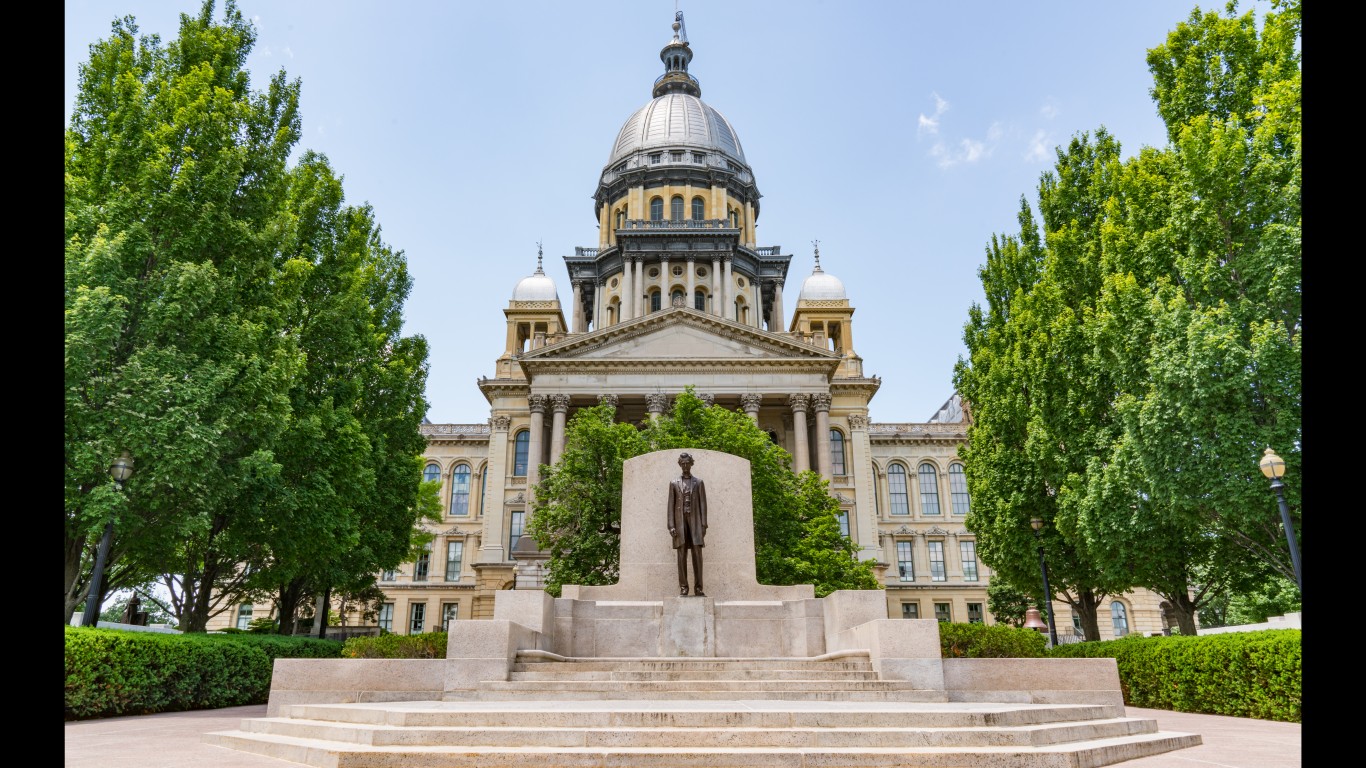
Illinois
> Firearm removal for “extreme risk” individuals: Yes, loss of firearm for a min. of 14 days, and a max. of 6 months
> Enforced gun removal for those with a crime-related possession ban: No
> Enforced gun removal for domestic violence convictions?: No
> Enforced gun removal for those under a domestic violence restraining order?: Yes
> Firearm laws for domestic violence emergency calls: Law enforcement must remove at least some firearms

Indiana
> Firearm removal for “extreme risk” individuals: Yes, loss of firearm for a min. of 2 days, and a max. of at least 180 days
> Enforced gun removal for those with a crime-related possession ban: No
> Enforced gun removal for domestic violence convictions?: No
> Enforced gun removal for those under a domestic violence restraining order?: No
> Firearm laws for domestic violence emergency calls: Law enforcement can remove at least some firearms

Louisiana
> Firearm removal for “extreme risk” individuals: No
> Enforced gun removal for those with a crime-related possession ban: No
> Enforced gun removal for domestic violence convictions?: Yes
> Enforced gun removal for those under a domestic violence restraining order?: No
> Firearm laws for domestic violence emergency calls: None
[in-text-ad-2]

Maryland
> Firearm removal for “extreme risk” individuals: Yes, loss of firearm for a min. of 1 day, and a max. of 1 year
> Enforced gun removal for those with a crime-related possession ban: No
> Enforced gun removal for domestic violence convictions?: No
> Enforced gun removal for those under a domestic violence restraining order?: No
> Firearm laws for domestic violence emergency calls: Law enforcement can remove at least some firearms

Massachusetts
> Firearm removal for “extreme risk” individuals: Yes, loss of firearm for a min. of 10 days, and a max. of 1 year
> Enforced gun removal for those with a crime-related possession ban: No
> Enforced gun removal for domestic violence convictions?: No
> Enforced gun removal for those under a domestic violence restraining order?: No
> Firearm laws for domestic violence emergency calls: None
[in-text-ad]

Michigan
> Firearm removal for “extreme risk” individuals: Yes (effective 2024), loss of firearm for a min. of 14 days, and a max. of 1 year
> Enforced gun removal for those with a crime-related possession ban: No
> Enforced gun removal for domestic violence convictions?: No
> Enforced gun removal for those under a domestic violence restraining order?: No
> Firearm laws for domestic violence emergency calls: None

Minnesota
> Firearm removal for “extreme risk” individuals: Yes (effective 2024), loss of firearm for a min. of 14 days, and a max. of 1 year
> Enforced gun removal for those with a crime-related possession ban: No
> Enforced gun removal for domestic violence convictions?: Yes
> Enforced gun removal for those under a domestic violence restraining order?: Yes
> Firearm laws for domestic violence emergency calls: None

Montana
> Firearm removal for “extreme risk” individuals: No
> Enforced gun removal for those with a crime-related possession ban: No
> Enforced gun removal for domestic violence convictions?: No
> Enforced gun removal for those under a domestic violence restraining order?: No
> Firearm laws for domestic violence emergency calls: Law enforcement must remove at least some firearms
[in-text-ad-2]

Nebraska
> Firearm removal for “extreme risk” individuals: No
> Enforced gun removal for those with a crime-related possession ban: No
> Enforced gun removal for domestic violence convictions?: No
> Enforced gun removal for those under a domestic violence restraining order?: No
> Firearm laws for domestic violence emergency calls: Law enforcement must remove at least some firearms

Nevada
> Firearm removal for “extreme risk” individuals: Yes, loss of firearm for a min. of 7 days, and a max. of 1 year
> Enforced gun removal for those with a crime-related possession ban: Yes
> Enforced gun removal for domestic violence convictions?: Yes
> Enforced gun removal for those under a domestic violence restraining order?: Yes
> Firearm laws for domestic violence emergency calls: None
[in-text-ad]

New Hampshire
> Firearm removal for “extreme risk” individuals: No
> Enforced gun removal for those with a crime-related possession ban: No
> Enforced gun removal for domestic violence convictions?: No
> Enforced gun removal for those under a domestic violence restraining order?: No
> Firearm laws for domestic violence emergency calls: Law enforcement must remove at least some firearms

New Jersey
> Firearm removal for “extreme risk” individuals: Yes, loss of firearm for a min. of 10 days with an indefinite max.
> Enforced gun removal for those with a crime-related possession ban: No
> Enforced gun removal for domestic violence convictions?: Yes
> Enforced gun removal for those under a domestic violence restraining order?: No
> Firearm laws for domestic violence emergency calls: Law enforcement must remove at least some firearms

New Mexico
> Firearm removal for “extreme risk” individuals: Yes, loss of firearm for a min. of 10 days, and a max. of 1 year
> Enforced gun removal for those with a crime-related possession ban: No
> Enforced gun removal for domestic violence convictions?: No
> Enforced gun removal for those under a domestic violence restraining order?: No
> Firearm laws for domestic violence emergency calls: None
[in-text-ad-2]

New York
> Firearm removal for “extreme risk” individuals: Yes, loss of firearm for a min. of 6 days, and a max. of 1 year
> Enforced gun removal for those with a crime-related possession ban: No
> Enforced gun removal for domestic violence convictions?: No
> Enforced gun removal for those under a domestic violence restraining order?: No
> Firearm laws for domestic violence emergency calls: None

Ohio
> Firearm removal for “extreme risk” individuals: No
> Enforced gun removal for those with a crime-related possession ban: No
> Enforced gun removal for domestic violence convictions?: No
> Enforced gun removal for those under a domestic violence restraining order?: No
> Firearm laws for domestic violence emergency calls: Law enforcement must remove at least some firearms
[in-text-ad]

Oklahoma
> Firearm removal for “extreme risk” individuals: No
> Enforced gun removal for those with a crime-related possession ban: No
> Enforced gun removal for domestic violence convictions?: No
> Enforced gun removal for those under a domestic violence restraining order?: No
> Firearm laws for domestic violence emergency calls: Law enforcement must remove at least some firearms

Oregon
> Firearm removal for “extreme risk” individuals: Yes, loss of firearm for a min. of 21 days, and a max. of 1 year
> Enforced gun removal for those with a crime-related possession ban: No
> Enforced gun removal for domestic violence convictions?: Yes
> Enforced gun removal for those under a domestic violence restraining order?: Yes
> Firearm laws for domestic violence emergency calls: None

Pennsylvania
> Firearm removal for “extreme risk” individuals: No
> Enforced gun removal for those with a crime-related possession ban: No
> Enforced gun removal for domestic violence convictions?: No
> Enforced gun removal for those under a domestic violence restraining order?: No
> Firearm laws for domestic violence emergency calls: Law enforcement must remove at least some firearms
[in-text-ad-2]

Rhode Island
> Firearm removal for “extreme risk” individuals: Yes, loss of firearm for a min. of 14 days, and a max. of 1 year
> Enforced gun removal for those with a crime-related possession ban: No
> Enforced gun removal for domestic violence convictions?: Yes
> Enforced gun removal for those under a domestic violence restraining order?: Yes
> Firearm laws for domestic violence emergency calls: None

Tennessee
> Firearm removal for “extreme risk” individuals: No
> Enforced gun removal for those with a crime-related possession ban: No
> Enforced gun removal for domestic violence convictions?: Yes
> Enforced gun removal for those under a domestic violence restraining order?: Yes
> Firearm laws for domestic violence emergency calls: Law enforcement must remove at least some firearms
[in-text-ad]
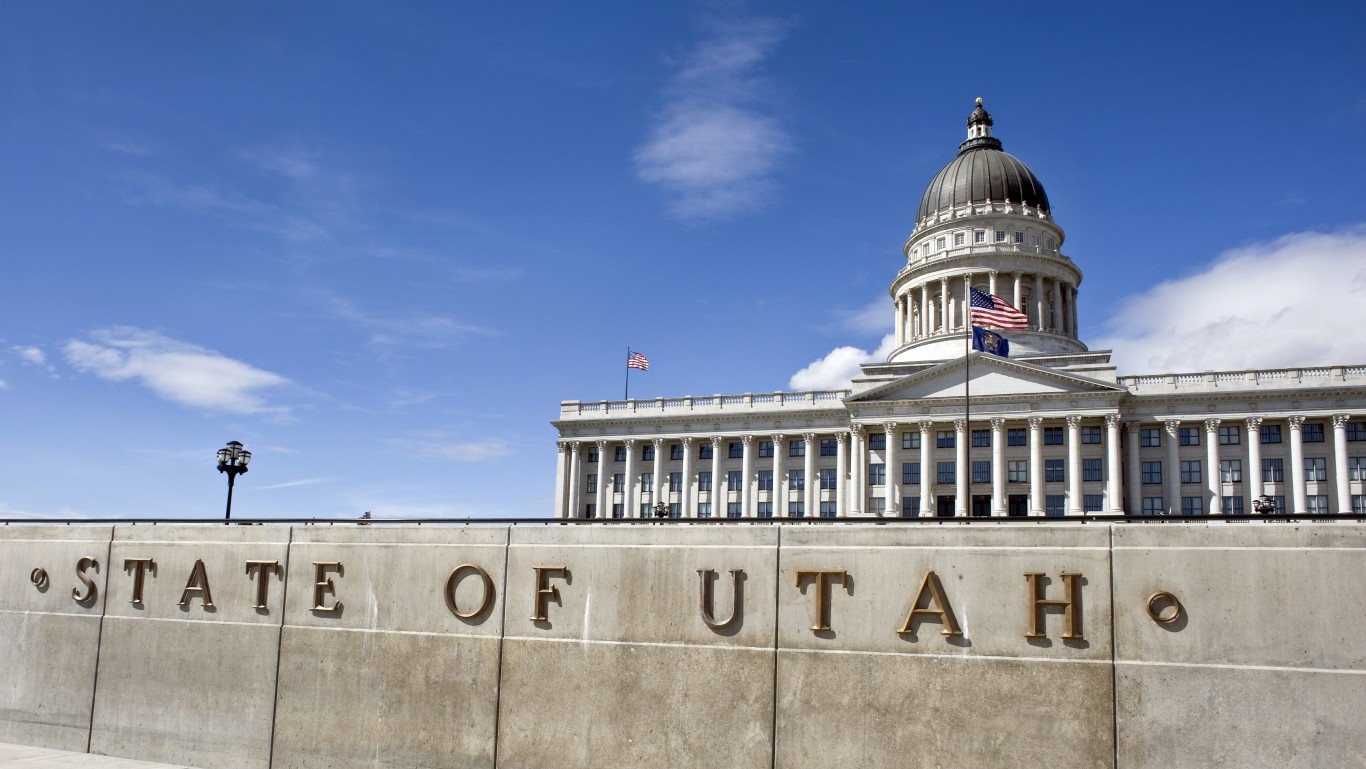
Utah
> Firearm removal for “extreme risk” individuals: No
> Enforced gun removal for those with a crime-related possession ban: No
> Enforced gun removal for domestic violence convictions?: No
> Enforced gun removal for those under a domestic violence restraining order?: No
> Firearm laws for domestic violence emergency calls: Law enforcement must remove at least some firearms

Vermont
> Firearm removal for “extreme risk” individuals: Yes, loss of firearm for a min. of 14 days, and a max. of 6 months
> Enforced gun removal for those with a crime-related possession ban: No
> Enforced gun removal for domestic violence convictions?: No
> Enforced gun removal for those under a domestic violence restraining order?: No
> Firearm laws for domestic violence emergency calls: Law enforcement can remove at least some firearms

Virginia
> Firearm removal for “extreme risk” individuals: Yes, loss of firearm for a min. of 14 days, and a max. of 6 months
> Enforced gun removal for those with a crime-related possession ban: No
> Enforced gun removal for domestic violence convictions?: No
> Enforced gun removal for those under a domestic violence restraining order?: Yes
> Firearm laws for domestic violence emergency calls: None
[in-text-ad-2]

Washington
> Firearm removal for “extreme risk” individuals: Yes, loss of firearm for a min. of 14 days, and a max. of 1 year
> Enforced gun removal for those with a crime-related possession ban: No
> Enforced gun removal for domestic violence convictions?: No
> Enforced gun removal for those under a domestic violence restraining order?: Yes
> Firearm laws for domestic violence emergency calls: Law enforcement must remove at least some firearms

West Virginia
> Firearm removal for “extreme risk” individuals: No
> Enforced gun removal for those with a crime-related possession ban: No
> Enforced gun removal for domestic violence convictions?: No
> Enforced gun removal for those under a domestic violence restraining order?: No
> Firearm laws for domestic violence emergency calls: Law enforcement must remove at least some firearms
[in-text-ad]

Wisconsin
> Firearm removal for “extreme risk” individuals: No
> Enforced gun removal for those with a crime-related possession ban: No
> Enforced gun removal for domestic violence convictions?: No
> Enforced gun removal for those under a domestic violence restraining order?: Yes
> Firearm laws for domestic violence emergency calls: None
Methodology
All data in this story was compiled by the Giffords Law Center, a gun violence prevention group. Each of the 34 states on this list have gone beyond the federal government in enacting laws to ensure certain individuals – either those who have committed specific crimes, or those who pose a direct threat to themselves or others – do not have access to firearms for a certain period of time, by either confiscating their firearms, or forcing the individual to relinquish their firearms.
Only states that have extreme risk protection order laws, or laws that mandate law enforcement to confiscate guns at the scene of a domestic violence call, or laws that verify certain convicted criminals have given up their firearms, or laws that ensure those under a domestic violence-related restraining order do not have access to firearms are on this list.
The Average American Has No Idea How Much Money You Can Make Today (Sponsor)
The last few years made people forget how much banks and CD’s can pay. Meanwhile, interest rates have spiked and many can afford to pay you much more, but most are keeping yields low and hoping you won’t notice.
But there is good news. To win qualified customers, some accounts are paying almost 10x the national average! That’s an incredible way to keep your money safe and earn more at the same time. Our top pick for high yield savings accounts includes other benefits as well. You can earn up to 3.80% with a Checking & Savings Account today Sign up and get up to $300 with direct deposit. No account fees. FDIC Insured.
Click here to see how much more you could be earning on your savings today. It takes just a few minutes to open an account to make your money work for you.
Our top pick for high yield savings accounts includes other benefits as well. You can earn up to 4.00% with a Checking & Savings Account from Sofi. Sign up and get up to $300 with direct deposit. No account fees. FDIC Insured.
Thank you for reading! Have some feedback for us?
Contact the 24/7 Wall St. editorial team.
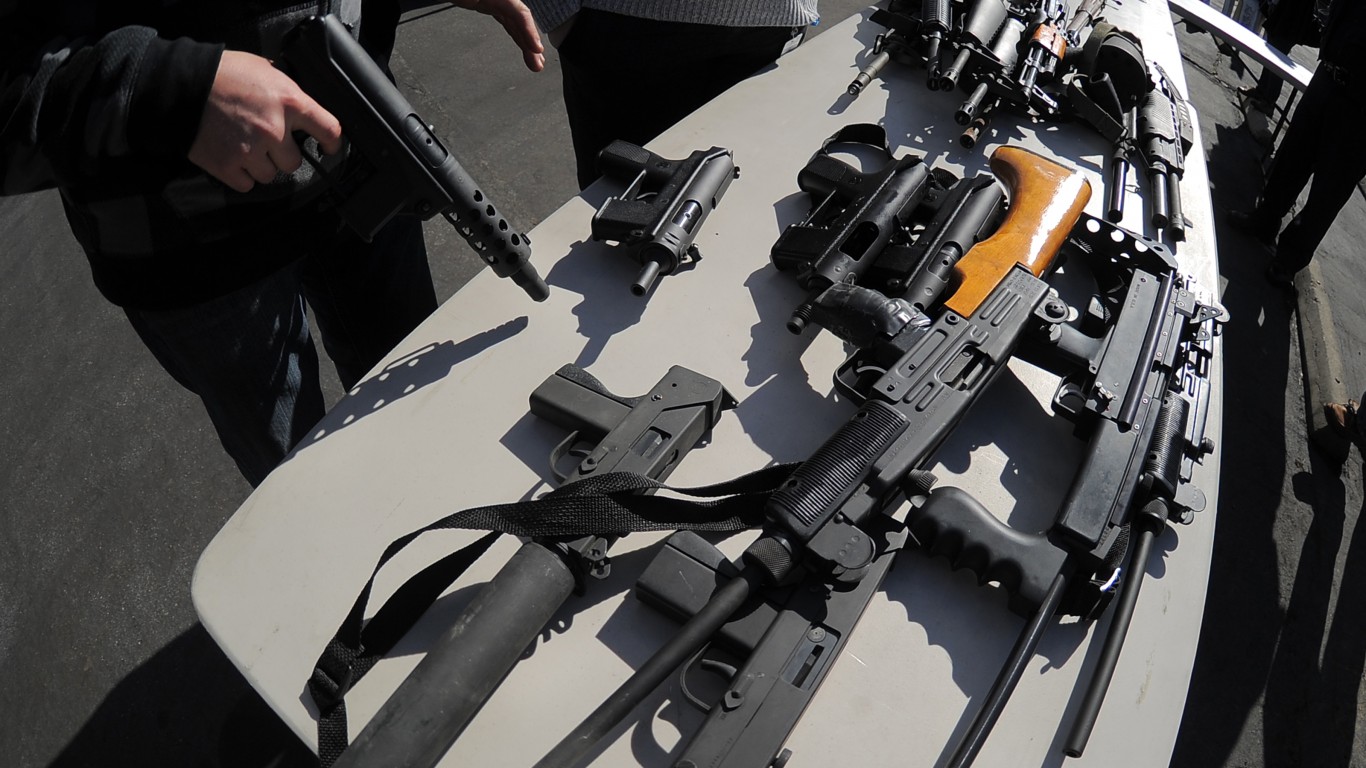 24/7 Wall St.
24/7 Wall St.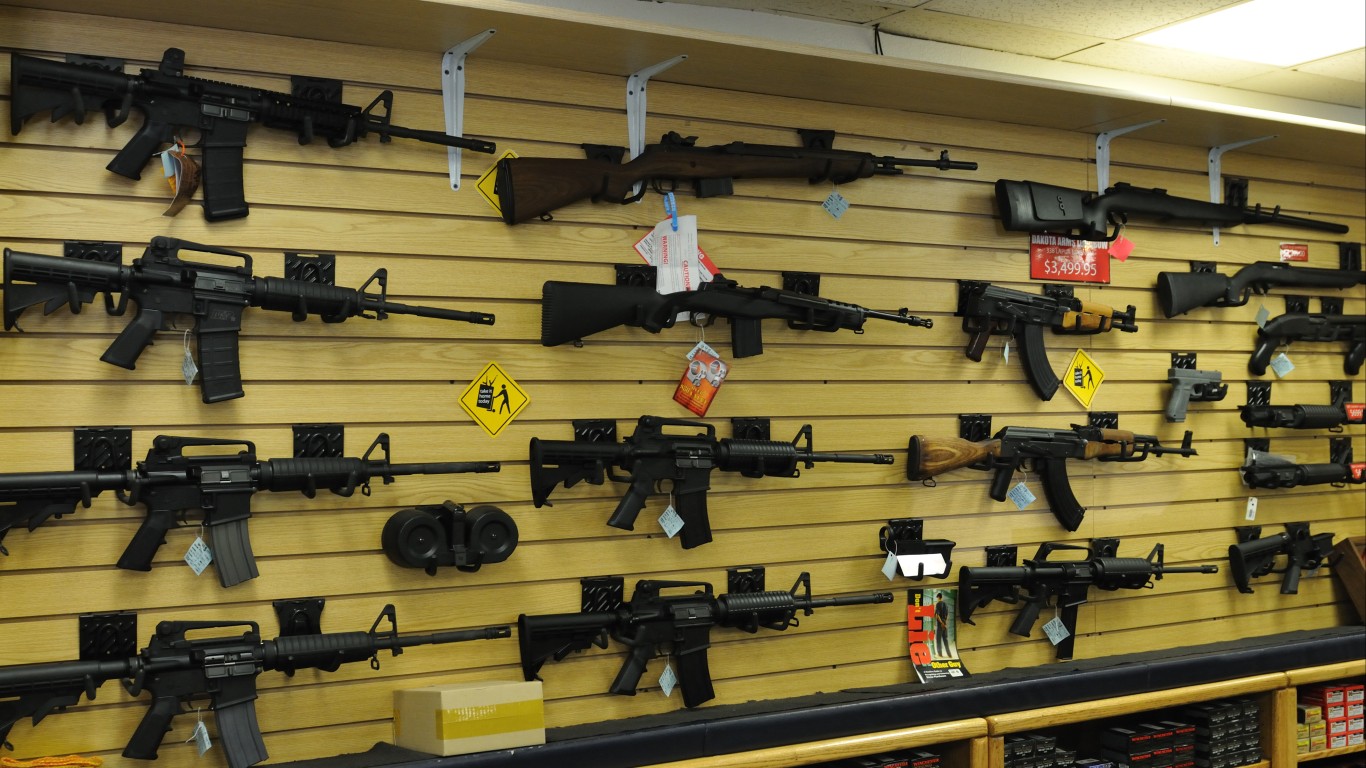 24/7 Wall St.
24/7 Wall St.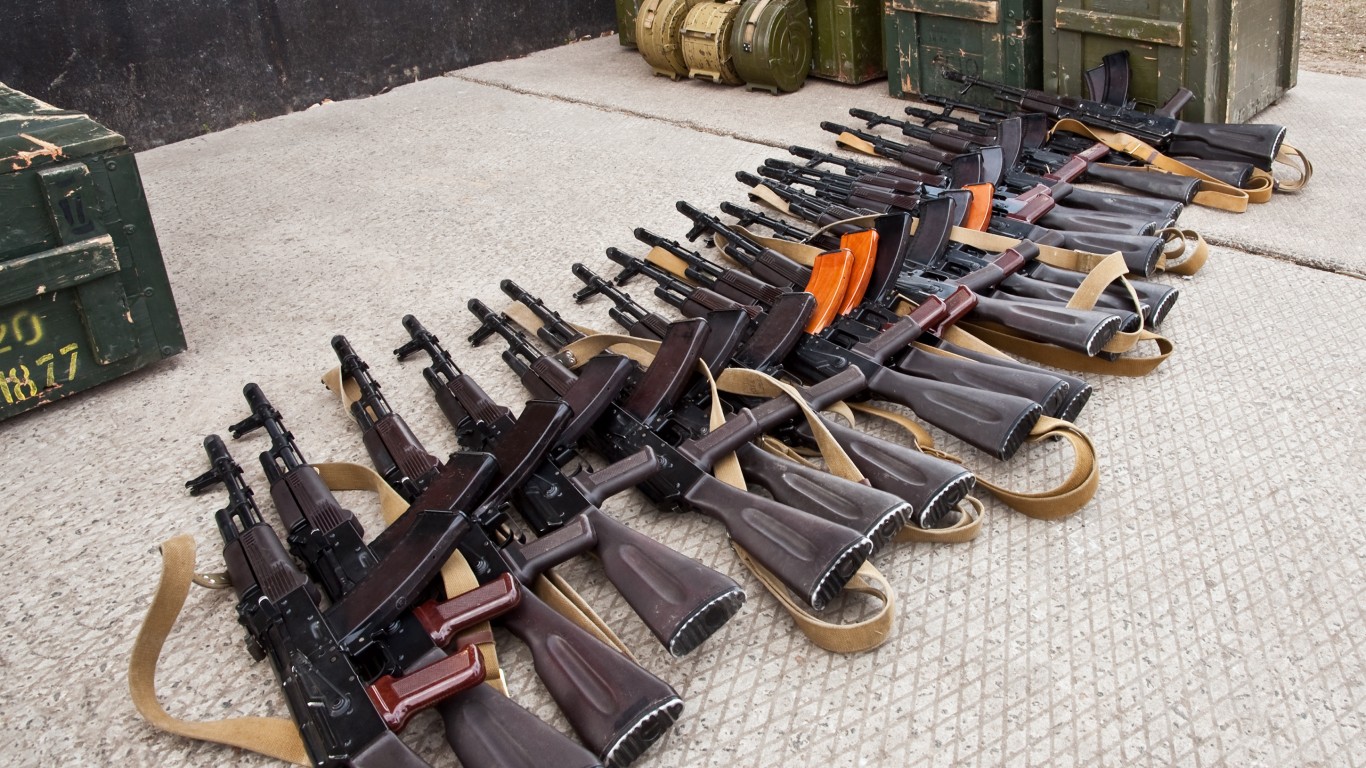 24/7 Wall St.
24/7 Wall St.
